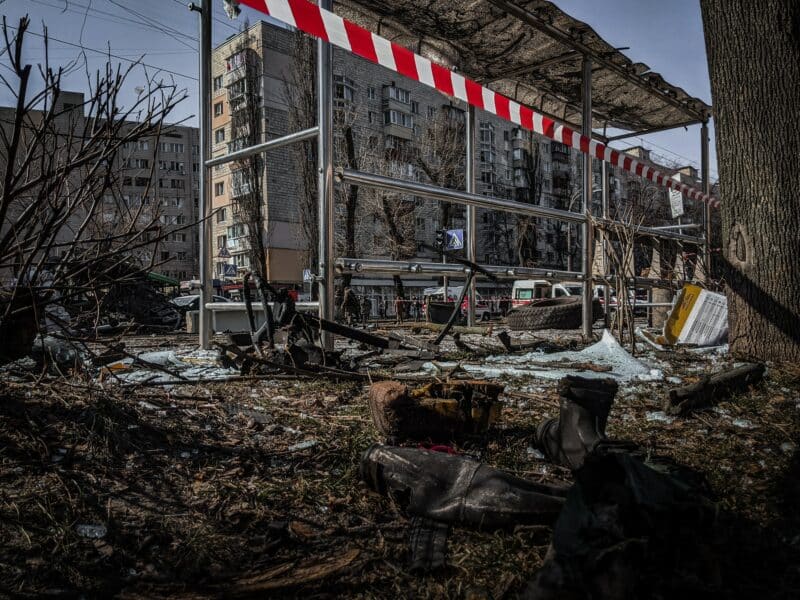The total damages to Ukraine’s infrastructure due to the Russian invasion have reached $157 billion, according to calculations by the Kyiv School of Economics. The World Bank estimates that the total cost of rebuilding Ukraine over the next decade will be $486 billion, with housing consuming the most funds. “Ukraine needs a comprehensive strategy for rebuilding and renovating its building resources,” evaluates Besim Nebiu from Habitat for Humanity International. He believes it should immediately address the housing issues that Ukrainian municipalities were facing even before the war.
“The destruction and damage to residential buildings in Ukraine are massive. This is an unprecedented situation in Europe since the end of World War II, affecting over 1 million residential units. According to World Bank estimates, the costs of modernizing, renovating, and repairing the destroyed and damaged residential units are estimated at 55 to 60 billion euros. These are enormous damages, associated with great human suffering, vast needs, and the necessity for numerous actions,” says Besim Nebiu, Director for Central and Eastern Europe at Habitat for Humanity International.
Kyiv School of Economics estimates that during nearly two years of war, from the start of the full-scale Russian military invasion to January 2024, the total amount of damages to buildings was over $157 billion (at reconstruction costs). Residential buildings accounted for the largest share of total damages—37.5 percent ($58.9 billion). The total area of residential buildings damaged or destroyed by shelling is 88.9 million square meters, or 8.6 percent of Ukraine’s housing resources.
The total damages from the destruction and damage of public sector facilities (social and institutional facilities, educational, scientific and health institutions, cultural and sports facilities, administrative buildings) amounted to approximately $13.7 billion.
The World Bank estimates that considering the destruction at the end of 2023, the total cost of rebuilding Ukraine in the next decade will be $486 billion. Ukrainian authorities estimate that in 2024 alone, the country will need about $15 billion for priority rebuilds, including housing, soft infrastructure, energy, and transport.
“Rebuilding will require massive investment funds. The participation of the international community is essential. These are not funds that could be sourced from Ukrainian resources. Moreover, there are also challenges related to the strategy of housing renovation, rebuilding, decisions on where to invest in repairs, where to renovate apartments, and where to rebuild entire buildings, as some are not suitable for repair. Should we first finance the repair of those apartments with minor damages or rather tackle those significantly damaged?” explains Besim Nebiu. “We are dealing with a fairly large number of internally displaced persons. We need to decide whether to deal with them first or rather with apartments that are currently inhabited. This requires careful thought and coordination.”
As of January this year, in a significant number of cities and municipalities, over half of the housing resources have been destroyed. A total of nearly 66,000 residential buildings have been completely destroyed (degree of destruction exceeds 40 percent), covering a total area of 25.2 million square meters. The largest losses in housing resources were recorded in Mariupol, Kharkiv, Chernihiv, Sievierodonetsk, and Bakhmut. Preliminary estimates indicate that in Sievierodonetsk, 90 percent of the buildings are destroyed, and in Bakhmut and Maryinka, there are no undamaged buildings.
“At this moment, Ukraine needs a comprehensive strategy for rebuilding and renovating its building resources, including housing resources, taking into account some issues that existed even before the war. However, the war has brought such massive destruction that any major program aimed at restoring housing conditions must be very carefully considered by authorities, investors, aid agencies, and international organizations,” asserts the director for Central and Eastern Europe at Habitat for Humanity International.
Since September 2022, Habitat for Humanity has been active in Ukraine in partnership with local and international organizations, supporting critical repairs in residential and social infrastructure—both financially and expertly. During a nine-month project, the organizations completed over 600 home repairs in the Kyiv and Kharkiv regions and communal infrastructure in Kharkiv. Meanwhile, in Odessa, Habitat for Humanity supported a project to adapt basements of houses into shelter conditions and also conducted modernization of heating systems in several buildings to significantly reduce energy demand.
